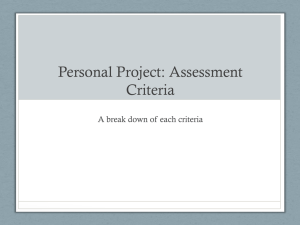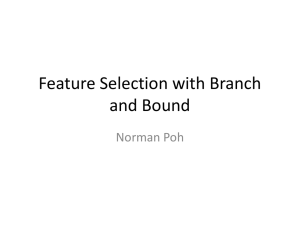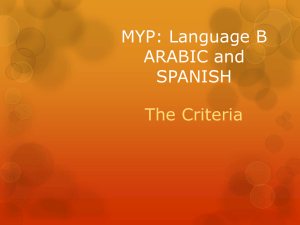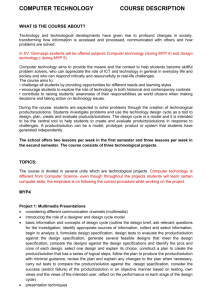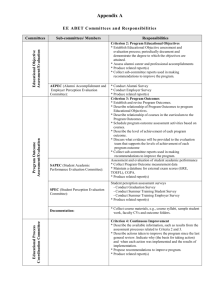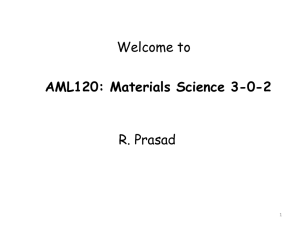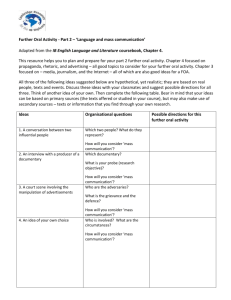ECET 302 Syllabus - Where can my students do assignments that
advertisement
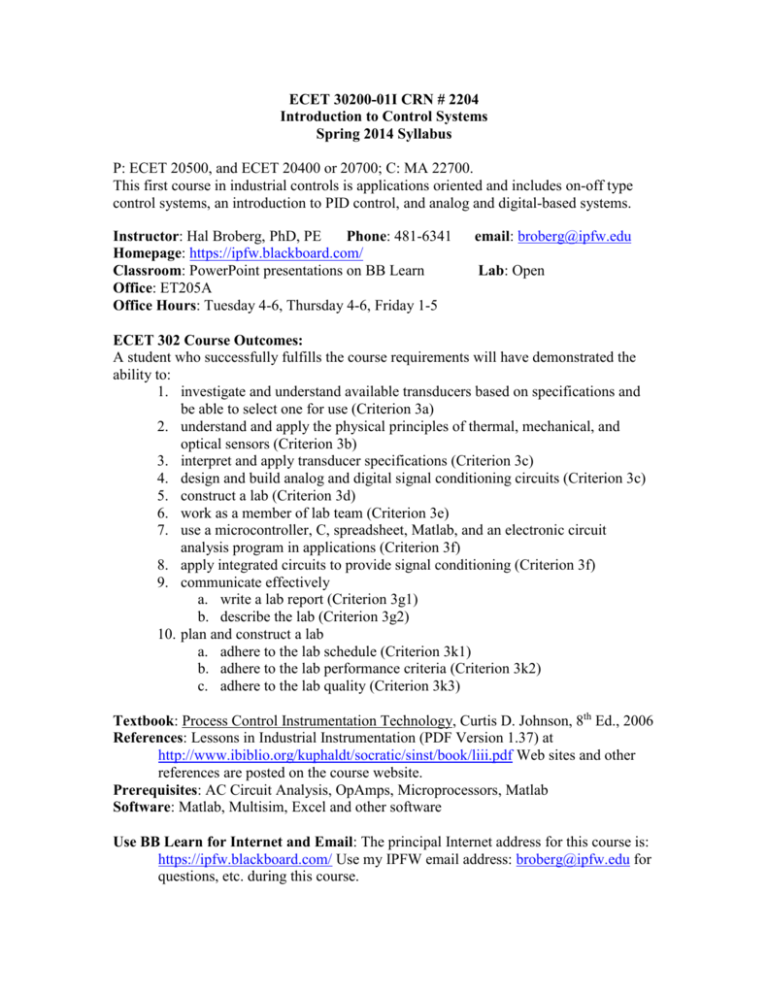
ECET 30200-01I CRN # 2204 Introduction to Control Systems Spring 2014 Syllabus P: ECET 20500, and ECET 20400 or 20700; C: MA 22700. This first course in industrial controls is applications oriented and includes on-off type control systems, an introduction to PID control, and analog and digital-based systems. Instructor: Hal Broberg, PhD, PE Phone: 481-6341 Homepage: https://ipfw.blackboard.com/ Classroom: PowerPoint presentations on BB Learn Office: ET205A Office Hours: Tuesday 4-6, Thursday 4-6, Friday 1-5 email: broberg@ipfw.edu Lab: Open ECET 302 Course Outcomes: A student who successfully fulfills the course requirements will have demonstrated the ability to: 1. investigate and understand available transducers based on specifications and be able to select one for use (Criterion 3a) 2. understand and apply the physical principles of thermal, mechanical, and optical sensors (Criterion 3b) 3. interpret and apply transducer specifications (Criterion 3c) 4. design and build analog and digital signal conditioning circuits (Criterion 3c) 5. construct a lab (Criterion 3d) 6. work as a member of lab team (Criterion 3e) 7. use a microcontroller, C, spreadsheet, Matlab, and an electronic circuit analysis program in applications (Criterion 3f) 8. apply integrated circuits to provide signal conditioning (Criterion 3f) 9. communicate effectively a. write a lab report (Criterion 3g1) b. describe the lab (Criterion 3g2) 10. plan and construct a lab a. adhere to the lab schedule (Criterion 3k1) b. adhere to the lab performance criteria (Criterion 3k2) c. adhere to the lab quality (Criterion 3k3) Textbook: Process Control Instrumentation Technology, Curtis D. Johnson, 8th Ed., 2006 References: Lessons in Industrial Instrumentation (PDF Version 1.37) at http://www.ibiblio.org/kuphaldt/socratic/sinst/book/liii.pdf Web sites and other references are posted on the course website. Prerequisites: AC Circuit Analysis, OpAmps, Microprocessors, Matlab Software: Matlab, Multisim, Excel and other software Use BB Learn for Internet and Email: The principal Internet address for this course is: https://ipfw.blackboard.com/ Use my IPFW email address: broberg@ipfw.edu for questions, etc. during this course. Homework: I encourage you to work together on homework assignments. If you work on homework together, please put both names on 1 submission. If computer generated, use the Word format and submit using the BB Learn Assignments. If handwritten, homework must be placed in my mailbox in the CEIT office, room ET-205. Labs: Lab assignments will be posted on BB Learn. No more than 3 persons per lab team are allowed without permission of the instructor. One lab report per team is required and will be submitted via BB Learn Assignments. Quizzes: There will be 3 multiple choice/true-false quizzes taken via the web. Each quiz may be taken twice. Sufficient time will be allowed each time you take a quiz and the higher of your two scores will count as your grade on each quiz. Grading Scale & Policy: The grade will be based on the total points for the course. This table is approximate. The final grade is based on your percentage. Activity % Points Homework 25 250 Labs 45 450 3 Quizzes 30 300 Total 100 1000 You can view your grades and see your current percentage grade on BB Learn. Grades for this course are in keeping with Purdue policy: Purdue Grades Below are the percentages used to determine grades for this course. Grade GPA Percentage A+ 4.0 93-100 % A 4.0 90-92.9 % A- 3.7 87-89.9 % B+ 3.3 84-86.9 % B 3.0 80-83.9 % B- 2.7 77-79.9 % C+ 2.3 74-76.9 % C 2.0 70-73.9 % C- 1.7 67-69.9 % D+ 1.3 64-66.9 % D 1.0 60-63.0 % D- 0.7 57-59.9 % (lowest passing grade) F 0.0 less than 57% (failing grade) ECET 302, Spring 2014: Course Outline Due dates for Lab and Homework assignments are with the assignment on Blackboard Week 1-Jan 13-17 Intro, Time response STUDY HOMEWORK: Planned Labs: I have done See BB Learn for Hmwk can be turned in via all of these & they work PPT lectures BB Learn or on paper Ch 1, Lecture(s), & Using MPLAB IDE 8.xx and as assigned the PICStart Plus Programmer 2-Jan 20-24 Statistics & Curve Fitting Ch 1, Lecture(s), & as assigned 3-Jan 27-31 Analog Signal Conditioning Ch 2, Lecture(s), & as assigned Lab #2: PIC16F684, PWM and DC Motor Control using a Photocell 4-Feb 3-7 Analog Signal Conditioning Ch 2, Lecture(s), & #2: Chap 2 + Lectures as assigned Lab #3: PIC16F684, PWM control using a Temp Sensor 5-Feb 10-14 Digital Signal Conditioning Ch 3, Lecture(s), & as assigned Lab catch-up week 6-Feb 17-21 Digital Signal Conditioning Ch 3, Lecture(s), & #3. Chap 3 + Lectures as assigned Lab #4: Thermistors 7-Feb 24-28 Thermal Sensors Ch 4, Lecture(s), & #4: Chapter 4 as assigned Also: Quiz 1 Covers Ch 1-3, Lectures, Labs 1-3, & as assigned Mechanical Ch 5, Lecture(s), & #5: Chap 5 + Lectures Sensors as assigned (20th=MLK Day) 8-Mar 3-7 Mar 10-14 9-Mar 17-21 SUBJECT #1: Chap 1 + Lectures SPRING BREAK No Class Optical Sensors Ch 6, Lecture(s), & #6: Chap 6 + Lectures as assigned 10-Mar 24-28 Final Control Ch 7, Lecture(s), & #7: Chap 7 + Lectures as assigned Lab #1: PIC16F684 and PWM Control using a POT Lab #5: Wheatstone Bridge Mon Feb 24 at 11:00 AM to Mon Mar 3 at 11:00 AM Lab #6: Hall Effect Transducers SPRING BREAK Lab #7: Intro to the Microstick II, using the 16bit, PIC24HJ 128GP502 Lab #8: Microstick II and Microstick Plus 11-Mar 31Apr 4 Final Control Also: Quiz 2 Ch 7, Lecture(s), & Covers Ch 4-6, Lecures, as assigned Labs thru Mar 21, & as assigned 12-Apr 7-11 Discrete Controllers Ch 8, Lecture(s), & #8: Chap 8 + Lectures as assigned Lab #9: Microstick Plus: UART/USB Comunication with Computer 13-Apr 14-18 Controller Principles Ch 9, Lecture(s), & #9: Chap 9 + Lectures as assigned Lab #10: UART/USB Datalogging using a Temp. Sensor 14-Apr 21-25 Analog Control Ch 9, Lecture(s), & as assigned 15-Apr 28-May 2 Analog Control Ch 10 , Lecture(s), & as assigned May 5-9 Finals Week Lab catch-up week Mon Mar 31 at 11:00 AM to Mon Apr 7 at 11:00 AM Lab #11: UART/USB Datalogging using a Touch Sensor #10: Chap 10 + Lectures Quiz 3: Mon Nothing accepted Covers entire course with May 5 at 11AM after 8:00 AM Sat, emphasis on Ch 7-10 to May 10 Sat May 10 at 8:00 AM Lab catch-up week
